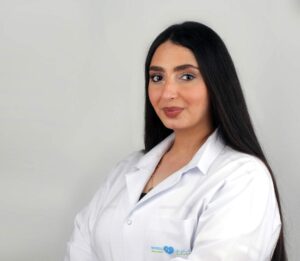Dietitian Clinic at Marble Medical Centre in Qatar
Comprehensive medical services and a key role in public awareness

The Dietitian Clinic at Marble Medical Centre in Qatar provides the necessary guidelines and recommendations to determine nutritional problems for the development of diet plans through highly experienced medical professionals. Dietitian Meerna Muhanna spoke to “Hospitals” magazine about the clinic’s features and its role in educating the public about the importance of a healthy diet. Below is the full interview:
What are the main services provided in the Dietitian Clinic?
The Dietitian Clinic at Marble Medical Centre offers nutritional advice, diet plans for weight loss, weight gain, weight maintenance, for pregnant and breastfeeding women as well as for athletes. We also provide educational counseling for children from 5 years old.
Moreover, we provide healthy meals for more than 8 diet plans in order to lose weight in a healthy and fast way. In the Nutrition Department, we also perform blood tests related to digestive problems, obesity and weight loss. The patient performs these tests; based on the results and according to the patient’s condition and goal, a specific diet or meal plan is developed to better achieve the weight-loss goal, while preventing any obstacle that may hinder the weight-loss journey. The Dietitian Clinic has the latest patented slimming and body tightening equipment. We also provide manual lymphatic massage for people who have undergone liposuction or who suffer from excessive water retention in different parts of the body.
What are the specifications of the Dietitian Clinic at Marble Medical Centre apart from others?
The main feature of the Dietitian Clinic at Marble Medical Centre would probably be its highly qualified and experienced medical staff as well as the state-of-the-art equipment that generate the best and most accurate outcomes. At Marble Medical Centre, we deal with each case individually, offering the patient a diet tailored to his body and condition. We follow the latest studies on different diets and present them to patients with various conditions and goals in order to get the fastest and best results. One of the clinic’s key features is to educate the public to make healthy and optimal food choices, because our ultimate goal is to make the patient fully aware of the importance of a healthy diet so that he learns about what suits him best.
Can you tell us about the most important steps you are taking in order to determine nutritional problems and provide the patients with the best advice? Are there any specific tests? How do you follow up on patient cases?
First, at the beginning of the consultation, we ask the patient to do some blood tests to make sure that there is no vitamin or mineral deficiency, such as iron, vitamin “D” and vitamin B12, which plays a major role in losing or gaining weight. In addition, hormones, blood sugar levels, cholesterol levels and the thyroid gland are also checked. Then, we perform a body analysis using the InBody 770, which is one of the latest and most accurate body composition devices that can help determine the weight, the amount of body fat mass and distribution, in addition to knowing the muscle, water and visceral fat percentage. We can also determine the waist circumference, the Body Mass Index (BMI) as well as the patient’s metabolic rate.
After performing the blood and InBody tests as well as learning about the patient’s medical history, we then develop a healthy diet tailored to each person’s condition and goal.
We follow up with the patient every two weeks to monitor the weight loss or weight gain journey, then according to each case, we make the necessary adjustments to the diet in order to help the patient reach his objective in the best way possible.

What about the dietitian’s role in providing strategies to prevent diet-related disease? How do you do it?
When we develop an individualized diet or meal plan tailored to the patient’s condition and goal, food diversification is taken into account in order to obtain an adequate amount of vitamins and minerals. We are keen to include carbohydrates from whole grains to adjust blood sugar levels, control appetite and induce satiety for a longer period of time.
We also strive to provide the patient with the appropriate amount of animal and plant proteins, if the person is a vegetarian. We take this into consideration and make sure that the patient gets the needed amounts of protein given its importance to the human body and its role in building tissues and muscles.
Protein is also essential for the skin, hair and nail growth and contributes to preventing hair loss, brittle nails and pallor that many people suffer from when they follow harsh weight-loss diets. We are also keen to supply the body with healthy unsaturated fats such as olives and olive oil, raw unsalted nuts such as walnuts, almonds, cashews, pistachios, fatty fish such as salmon and tuna, and seeds such as chia and flax for better brain health and maintaining normal cholesterol levels. The patient is always provided with two servings of fresh fruits, and we recommend following the Qatar Dietary Guidelines in order to obtain the important antioxidants to protect the cells from free radical damage and cell deterioration. We make sure to include in the diet 3-5 servings of different vegetables to maintain a healthy digestive system and supply it with various vitamins, minerals and fibers that the body needs.
How can we relate diseases and food when we talk about therapeutic diets? What is your role in this field?
Healthy eating plays an effective role in preventing disease and vice versa, as poor nutrition contributes to disease. There is a lot of researches that proves this, whether the person is healthy or suffers from health problems and illnesses such as diarrhea, constipation, poisoning and other minor health issues.
Many people suffer from malnutrition or vitamin and mineral deficiencies; as a result, the patient shows clear symptoms and is treated by taking dietary supplements and following a healthy diet rich in these vitamins and minerals in order to compensate for the deficiencies and restore the body in record time.
Many people also suffer from some diseases such as diabetes, osteoporosis, rickets, pellagra, beriberi, high cholesterol levels, etc. These diseases are linked to poor nutrition and a deficiency in several nutrients such as niacin, protein and vitamin B12.
An integrated and balanced healthy diet that contains all the important nutrients such as vitamins, minerals, carbohydrates, protein, fats and fibers contributes to the prevention of many diseases related to malnutrition and poor diet.














